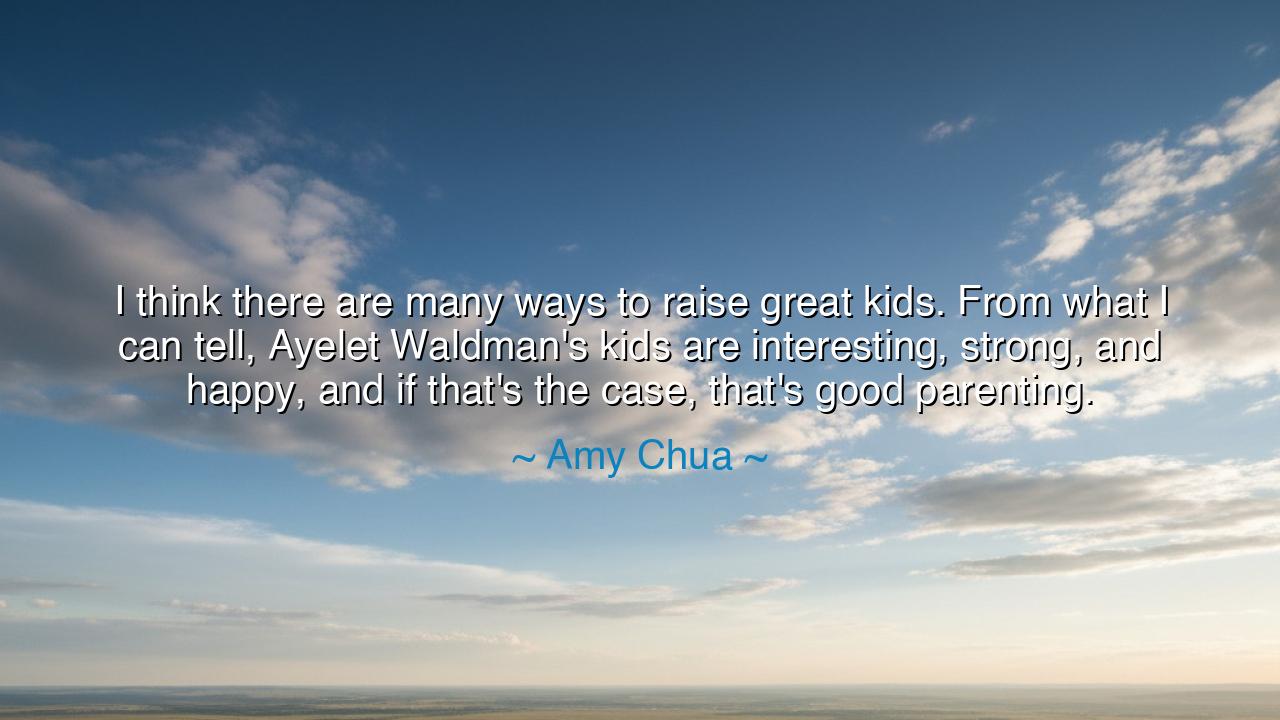
I think there are many ways to raise great kids. From what I can
I think there are many ways to raise great kids. From what I can tell, Ayelet Waldman's kids are interesting, strong, and happy, and if that's the case, that's good parenting.






Hear the voice of Amy Chua, often called the “Tiger Mother,” yet here speaking with humility and generosity: “I think there are many ways to raise great kids. From what I can tell, Ayelet Waldman’s kids are interesting, strong, and happy, and if that’s the case, that’s good parenting.” These words remind us that the path of parenting is not a single narrow road but a vast landscape, where many different ways may lead to the same summit: children who grow to be whole, resilient, and joyful. It is not the rigidity of method that proves success, but the fruit it bears in the lives of the children themselves.
In this reflection, Chua honors her fellow writer and mother, Ayelet Waldman, whose parenting philosophy is strikingly different from her own. Waldman has written candidly of love, freedom, and imperfection, often in contrast to Chua’s stricter ideals. And yet, Chua concedes that if Waldman’s children are interesting, strong, and happy, then her way, too, is valid. Here we find a lesson in humility: that even the fiercest convictions must make room for the truth that there are many ways to raise great kids. The true measure is not whether the parent followed a universal formula, but whether the children emerge flourishing.
The ancients, too, grappled with this diversity of paths. In China, Confucius praised discipline, order, and reverence, while Laozi exalted the flow of nature and gentle yielding. Both philosophies produced wisdom, yet they stood in tension. In Greece, Sparta raised its children with iron discipline, while Athens raised them in freedom of thought and speech. And yet, from both arose individuals of greatness. The lesson of history is the same as Chua’s: there is no single form of good parenting; rather, the outcome lies in whether children are prepared for life, in strength of body, spirit, and heart.
Consider the story of John Stuart Mill, the philosopher. He was raised by his father with rigorous education, reading Greek at an age when most boys were still learning letters. Yet though this strictness gave him intellectual brilliance, it nearly crushed his spirit until, through friendships and love, he rediscovered joy. His greatness was not the product of discipline alone, but of discipline joined with affection and freedom. Here we see again that parenting is many-sided, and that the true goal is not the following of rules but the nurturing of children into fullness.
Chua’s words carry also a gentle rebuke to the arrogance that so often accompanies debates on parenting. Too often do parents boast, “My way is the right way,” dismissing all others. But she reminds us that good parenting is proven in the child, not in the parent’s pride. If the child grows strong, curious, and content, then the parent has done well, no matter how unconventional their path. In this spirit, she honors Waldman’s family not by comparing it to her own, but by recognizing the strength and happiness of its children.
The lesson, then, is this: seek not to copy others, but to discover what works for your own family. Look to the examples of others with respect, not with judgment. Ask not, “Am I following the perfect method?” but rather, “Are my children growing in strength, in joy, in curiosity?” For this is the true measure of parenting—not conformity to a system, but the flourishing of the children entrusted to you.
Therefore, let every parent who hears these words take action: honor the diversity of ways to raise children, and focus on the fruits, not the formulas. Seek wisdom from others, but do not condemn those whose path differs from yours. Strive above all that your children may be interesting in spirit, strong in character, and happy in soul. In this lies the true legacy of parenting, the gift that endures beyond your years.
Thus Amy Chua’s words, born from reflection on her own journey and that of another, echo ancient wisdom: there are many paths to raise great children, and each parent must find their own. What matters is not the road itself, but the destination—the flourishing of the next generation. And this truth is both humbling and liberating, for it frees us from pride and calls us to focus on what is most sacred: the well-being of our children.






AAdministratorAdministrator
Welcome, honored guests. Please leave a comment, we will respond soon